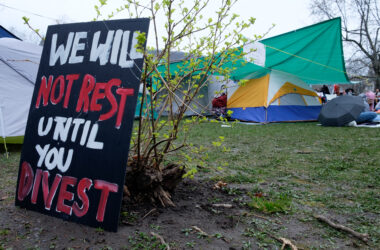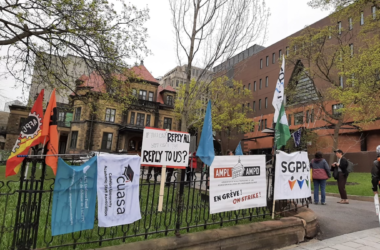At Queen’s University, the Water Access Group, a group of students and professors interested in promoting public water and discouraging the use of bottled water, has completed a study of the school’s water fountains.
The group found that 84 of 151 fountains were broken or dirty, and only 24 had gooseneck spouts for refilling water bottles, which prompted them to write an open letter to Daniel Woolf, the university’s principal. The letter advocates repairing the fountains as well as cutting back on bottled water sales on campus. WAG’s ultimate goal is to phase out bottled-water sales on campus.
“We’re encouraging students to understand the implications of their purchase of bottled water, whether that’s from a social justice perspective or … just in terms of cost,” said Claire Nelischer, the sustainability co-ordinator for Queen’s Alma Mater Society and a member of WAG.
Should they succeed, Queen’s would become the fourth university in Canada to ban bottled water on campus, joining the University of Winnipeg, Memorial University in Newfoundland, and Brandon University in Manitoba.
Montague said that such bans are easy, effective, and ethical, and criticized commercial water distributors.
“Commodifying a basic human right and selling it for more than a gallon of gasoline, it’s ridiculous,” said Stephen Montague, president of the Brandon University Students’ Union.
Commercial water distributors, however, argue that water is chemically safest when bottled. As well, according to a press release on its website, the International Bottled Water Association has collaborated with relief agencies to provide bottled water to those affected by the earthquake in Haiti.
Nonetheless, students across Canada appear to support bottle bans. Students’ Society President Ivan Neilson said that universities could help set good examples for society.
“We can show some leadership in that area,” Neilson said. “I think it’s a great initiative.”
While SSMU has banned bottled water in the Shatner Building, the prospects for a campus-wide ban are less promising.
“[The university] is very hesitant to enter into commitments like [this],” Neilson said.
Other university administrations have been more responsive to their student unions. Montague said that negotiations with the administration at Brandon were easy after a bottled-water ban motion was approved by the Students’ Union.
“Within a month, we had the signed Water Pledge,” he said. “Our administration [was] fantastic to work with. They saw the value in the proposal and they were fantastic partners.”
Nelischer argued, however, that bottled-water bans are not always so simple.
“It’s very context-specific,” she said. “We’ve looked to the other universities to see what they’re doing as an example, but even the awareness campaigns and student movements don’t necessarily apply to the situation that we’re in here.”
The University of Winnipeg, for instance, was not in an exclusive contract with a beverage provider when it decided to ban bottled water. Queen’s, however, has an exclusive contract with Coca-Cola, making it difficult for groups like the WAG to make changes.
Queen’s contract with Coca-Cola expires in August, and the WAG hopes to either persuade the university not to renew it or to insert a clause banning bottled water in the new contract.
“It’s very time sensitive, what we’re doing right now,” Nelischer said.








